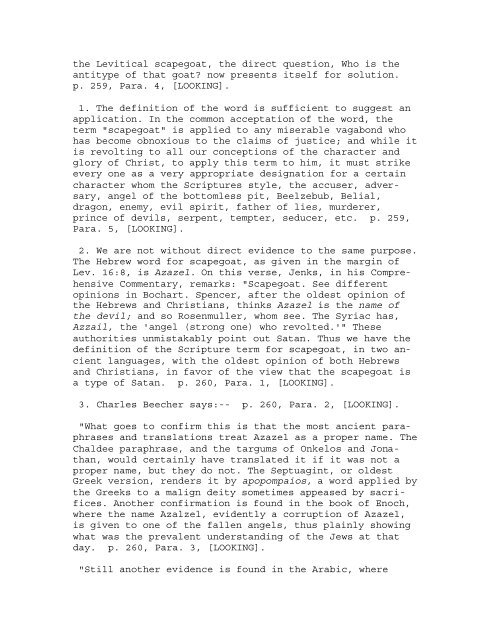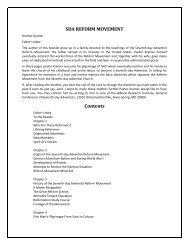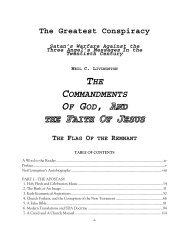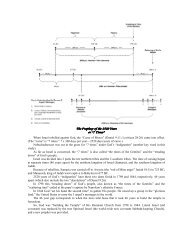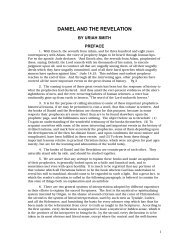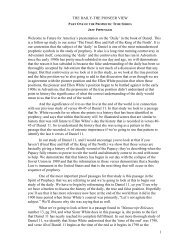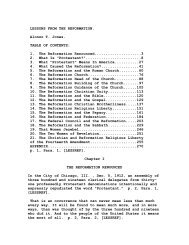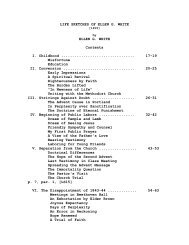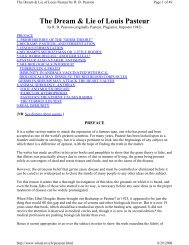LOOKING UNTO JESUS OR CHRIST IN TYPE AND ANTITYPE. BY ...
LOOKING UNTO JESUS OR CHRIST IN TYPE AND ANTITYPE. BY ...
LOOKING UNTO JESUS OR CHRIST IN TYPE AND ANTITYPE. BY ...
You also want an ePaper? Increase the reach of your titles
YUMPU automatically turns print PDFs into web optimized ePapers that Google loves.
the Levitical scapegoat, the direct question, Who is the<br />
antitype of that goat? now presents itself for solution.<br />
p. 259, Para. 4, [<strong>LOOK<strong>IN</strong>G</strong>].<br />
1. The definition of the word is sufficient to suggest an<br />
application. In the common acceptation of the word, the<br />
term "scapegoat" is applied to any miserable vagabond who<br />
has become obnoxious to the claims of justice; and while it<br />
is revolting to all our conceptions of the character and<br />
glory of Christ, to apply this term to him, it must strike<br />
every one as a very appropriate designation for a certain<br />
character whom the Scriptures style, the accuser, adversary,<br />
angel of the bottomless pit, Beelzebub, Belial,<br />
dragon, enemy, evil spirit, father of lies, murderer,<br />
prince of devils, serpent, tempter, seducer, etc. p. 259,<br />
Para. 5, [<strong>LOOK<strong>IN</strong>G</strong>].<br />
2. We are not without direct evidence to the same purpose.<br />
The Hebrew word for scapegoat, as given in the margin of<br />
Lev. 16:8, is Azazel. On this verse, Jenks, in his Comprehensive<br />
Commentary, remarks: "Scapegoat. See different<br />
opinions in Bochart. Spencer, after the oldest opinion of<br />
the Hebrews and Christians, thinks Azazel is the name of<br />
the devil; and so Rosenmuller, whom see. The Syriac has,<br />
Azzail, the 'angel (strong one) who revolted.'" These<br />
authorities unmistakably point out Satan. Thus we have the<br />
definition of the Scripture term for scapegoat, in two ancient<br />
languages, with the oldest opinion of both Hebrews<br />
and Christians, in favor of the view that the scapegoat is<br />
a type of Satan. p. 260, Para. 1, [<strong>LOOK<strong>IN</strong>G</strong>].<br />
3. Charles Beecher says:-- p. 260, Para. 2, [<strong>LOOK<strong>IN</strong>G</strong>].<br />
"What goes to confirm this is that the most ancient paraphrases<br />
and translations treat Azazel as a proper name. The<br />
Chaldee paraphrase, and the targums of Onkelos and Jonathan,<br />
would certainly have translated it if it was not a<br />
proper name, but they do not. The Septuagint, or oldest<br />
Greek version, renders it by apopompaios, a word applied by<br />
the Greeks to a malign deity sometimes appeased by sacrifices.<br />
Another confirmation is found in the book of Enoch,<br />
where the name Azalzel, evidently a corruption of Azazel,<br />
is given to one of the fallen angels, thus plainly showing<br />
what was the prevalent understanding of the Jews at that<br />
day. p. 260, Para. 3, [<strong>LOOK<strong>IN</strong>G</strong>].<br />
"Still another evidence is found in the Arabic, where


